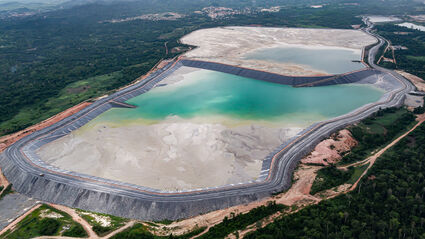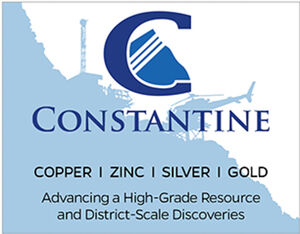New standards raise tailings storage bar
UN, ICMM introduce global standard for tailings management North of 60 Mining News – August 7, 2020
Last updated 9/26/2020 at 3:13pm

Newmont
This tailings storage facility at the Akyem Mine in Africa has been designed and constructed to safely contain the tailings and water, even during extreme climatic or seismic events.
The International Council on Mining and Minerals (ICMM) and the United Nations Environment Program (UNEP) have introduced standards for the safe management of new and existing mine tailings facilities around the globe, no matter where they are located or who operates them.
Tailings facilities, structures constructed to store material that is finely ground to extract the sought-after minerals, are used at most mining operations.
"These dams are some of the largest human-made structures on the planet and require careful ongoing management," said Elaine Baker, a UNESCO professor of marine science at the University of Sydney and member of the international advisory panel that oversaw the development of the new protocols. "While large-scale failures of tailings dams are uncommon, when they do occur, they can be catastrophic for downstream communities and the environment."
It was one such disaster, the tailings dam failure at a mine in Brazil that killed 270 people, that prompted ICMM and UN to join forces with Principles of Responsible Investment (PRI), which represents US$103.4 trillion in assets under management, to develop new global tailings management practices.
"The catastrophic dam collapse at Vale's Córrego de Feijão mine in Brumadinho was a human and environmental tragedy that demanded decisive and appropriate action to enhance the safety and strengthen the governance of tailings facilities across the globe," said Bruno Oberle, chair of the Global Tailings Review.
The more than one-year process has resulted in the Global Tailings Review, an industry standard aimed at the total elimination of tailings dam failures.
The reasons for these failures are well understood, so the task of the review was to establish a standard that would ensure mine operators applied best practices in planning, design, construction, operation, maintenance, monitoring, closure and post-closure of tailings facilities.
The global industry standard on tailings management that came out of this review elevates accountability to the highest organizational levels and adds new requirements for independent oversight. The standard also establishes clear expectations around global transparency and disclosure requirements, helping to improve understanding by interested stakeholders.
This new standard covers the entire tailings facility lifecycle – from site selection, design and construction, management, and monitoring, through to closure and post-closure.
"The differences between the global standard and many existing standards for tailings dam management include provisions for greater consultation from the outset with potentially affected communities," Baker said.
"It also includes increased independent engineering oversight at all stages of tailings management; more transparent mine operator accountability; increased public access to consequence of failure information; and an increased standard of reporting," the UNESCO professor added. "These initiatives represent a system-wide change in tailings management."
UNEP, ICMM and PRI have each endorsed the tailings standard and call for its broad and effective implementation across the industry:
• UNEP will support governments that wish to incorporate this standard into their national or state legislation and policies.
• PRI will be developing investor expectations to support all mining companies in implementing the standard.
• ICMM member companies will implement the standard as a commitment of membership, which includes robust site-level validation and third-party assessments.
Barrick Gold Corp., an ICMM member and participant in the tailings review process, welcomes the increased accountability and expectations demanded by the new standards.
"Our tailings and heap leach management standard comprises six levels of inspection and surety," said Barrick Gold Sustainability Executive Grant Beringer. "These range from high-tech monitoring technology, including piezometers, inclinometers, drone and satellite surveys, to movement detection and drainage measurement. Internal specialists conduct regular assurance audits and our tailings management is also reviewed by an independent tailings review committee composed of internationally recognized experts in this field."
Earthworks, a global environmental organization that served in an advisory role during the tailings review, said the new standard does not go far enough.
"The ultimate goal of tailings management must be zero harm to people and the environment and zero tolerance for human fatalities," said Earthworks Mining Program Director Payal Sampat. "A meaningful standard for tailings dams must require financial assurance and insurance, and accountability at the highest level of corporate governance."
Ligia Noronha, director of the economy division at UNEP, believes the new global tailings standard advance the global mining sector toward this very objective.
"The Global Industry Standard on Tailings Management is an important milestone towards the ambition of zero harm to people and the environment from tailings facilities," said the economist with more than three decades of international experience in promoting environmental sustainability.
















Reader Comments(0)